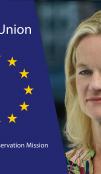It’s the end of September and election day in Iraq – sort of …

It’s almost the end of September and election day in Iraq - at least it is for the Independent High Electoral Commission (IHEC). While the actual election day for the general public is still some weeks away, the electoral commission is testing in a country-wide simulation, technology and procedures for the 10 October parliamentary polls. Amongst dignitaries and observers, watching the event in the simulation-room at the highly secured IHEC compound in the Baghdad International Zone: Margarida Alves, electoral analyst of the European Union Election Observation Mission Iraq. She is part of the core team of twelve analysts, working since late August in Baghdad and Erbil.
“This is an important event, mainly of course for the IHEC but also for us as the EUEOM”, says Alves. For her - and for the EU EOM long term observers in the field it’s the first time they see the electronic devices which will be used during election day “in action”. “This simulation and the findings of the IHEC give us a good indication what to look for on election day”, explains the analyst. “Iraq ‘s counting and results transmission system is almost entirely electronic. Most voters have biometric voter cards, the marked ballot papers are scanned and counted automatically when they are inserted in the ballot box and election results are transmitted via satellite to the IHEC national office in Bagdad”, says Alves, adding: “This advanced technology was chosen to reduce the risk of fraud. On election day we will observe and assess how this technology works in real conditions.”
Although election day with voting, counting and transmission of results is an important element of the EU EOM’s analysis - it’s not the only part of the assessment. “As the electoral analyst I take a holistic look at the performance of the IHEC. That includes for example the technical electoral preparations, voter registration process, voter education and public outreach and the degree of impartiality shown by the election administration.“
While Alves works at the mission headquarters in Baghdad, she has a counterpart in Erbil who covers all electoral and legal matters in the Kurdistan Region of Iraq. Electoral and legal analyst Alessandro Giongo looks for example also into matters that are specific for the region, such as minorities and internally displaces persons (IDPs). “Genuine elections have to be inclusive across any country. That includes the right to stand for office, and the right to vote for all eligible Iraqis” says Giongo. “Both are part of the international standards we use for our assessment.”
“Although our methodology is mainly based on international and regional standards, it is important to say that none of these standards are imposed by the European Union”, stresses Chief Observer Viola von Cramon. “These standards are included in the international commitments for democratic elections to which Iraq has subscribed to and in the Iraqi law. We only assess the extent to which the elections comply with these international, regional and national commitments”, emphasises the Chief Observer.
“The work of the electoral analyst and of her colleagues is also based on a long-term observation methodology which covers the entire process. We don’t just fly in for the election day and leave right after. Our assessment is comprehensive and thorough”, says Chief Observer Viola von Cramon.
The EU EOM will publish its assessment of the election process two days after the election day in its preliminary statement. This report will include all findings up to this day. Observers will remain in the country until well after this date to observe the post-election developments.





